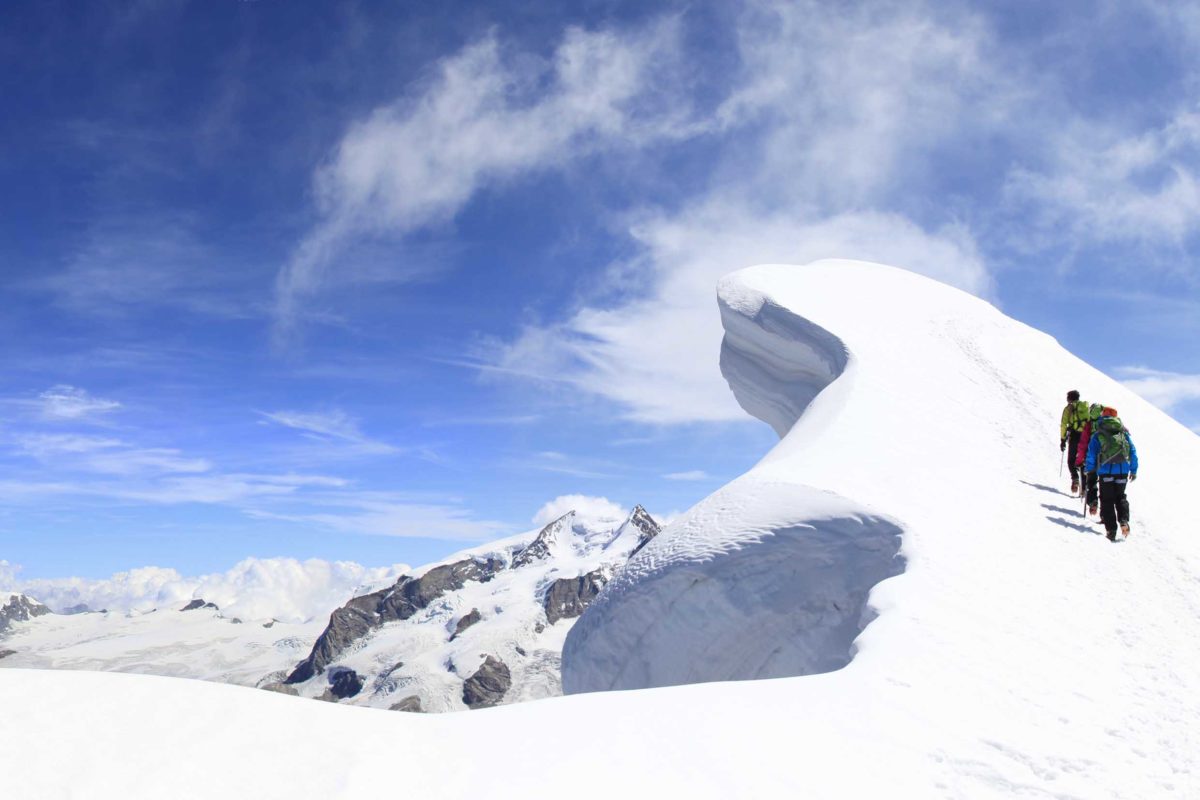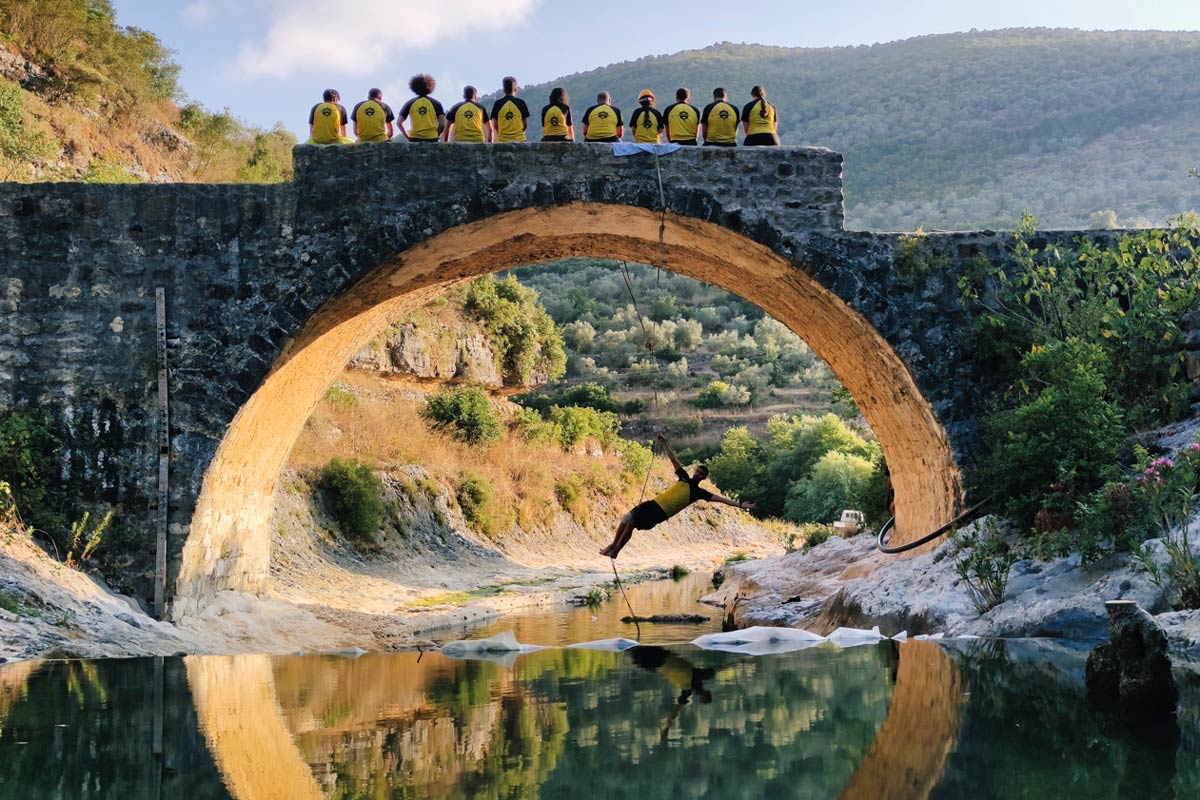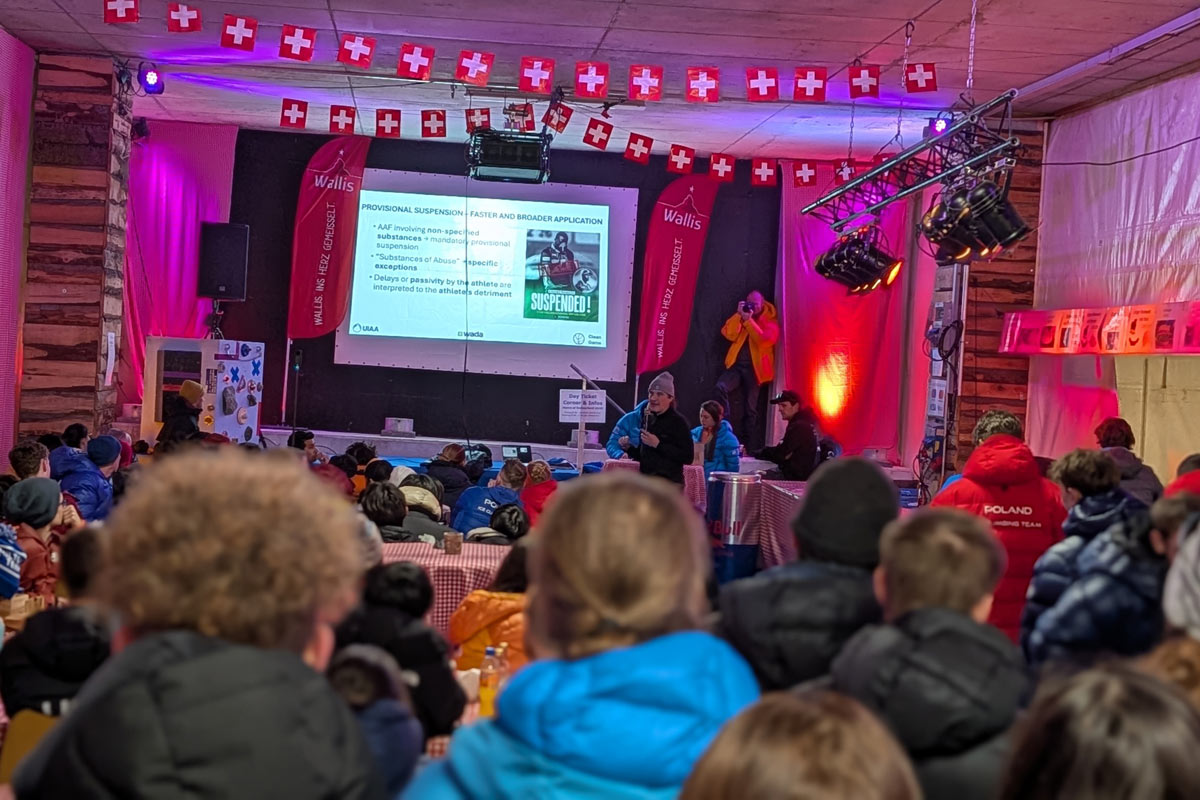The UIAA Summit Charter 2002
Proposals for collaboration with governments and international bodies to recognise and promote the contribution of mountaineering, climbing and trekking to sustainable mountain objectives.
Launched in St Johann im Pongau – Austria in October 2001 at the General Assembly of the UIAA for the International Year of Mountains 2002
International Mountaineering and Climbing Federation
Union Internationale des Associations d’alpinisme
The UIAA
- Is the international organisation that represents mountaineers, climbers, and trekkers or hill walkers, worldwide.
- Was formed in 1932 and has some 90 member organisations, most of which are the national federations of over 60 countries.
- Has expertise in:
- the practise of mountain activities, including youth activities;
- mountain access linked with the conservation and protection of the mountain environment;
- competition climbing and ski-mountaineering;
- the development and publication of standards and codes of practise;
- mountaineering and climbing equipment and safety; and
- mountain medicine.
- Is recognised by the International Olympic Committee as the International Sports Federation representing mountaineering, climbing and related mountain activities. And
- Supports the International Year of Mountains 2002 with an extensive programme of activities.It is a member of the UN Inter-Agency Group; and has links with other international organisations.
Responsible for content: Alan Blackshaw, GB; Chairman of the UIAA IYM Working group
The need for the UIAA Summit Charter 2002
Mountaineering, climbing, and trekking (or hill walking) are some of the most extensive and economically significant activities in the world’s mountain areas and other wild terrain.
It is important that they should make their full contribution to the sustainable mountain objectives of the International Year of Mountains 2002, and thereafter, especially by helping to sustain local communities.
Our starting point is that everyone should have the freedom to enjoy the natural environment, including mountains, while conserving its integrity and value.
In the case of mountaineering, climbing or trekking, this involves:
- Responsible access to mountains and cliffs, and to facilities such as mountain huts and climbing walls.
- Safeguarding the wild and natural characteristics of mountains and cliffs, by agreeing and following codes of good practice, and having regard to the carrying capacity of the terrain.
- Self-reliance and personal responsibility for the risks of participation.
- Opportunities for training in good practice and safety, and environmental awareness, and through high performance to excel and raise standards.
We seek collaboration with governments and international organisations world-wide so that the potential contribution of mountaineering, climbing and trekking to sustainable mountain objectives may be recognised and promoted; and especially so that local communities may derive appropriate benefit from these activities.
The need for freedom of responsible access to mountains, cliffs and other wild terrain, linked with care for the natural environment, should also be recognised and supported.
We seek this collaboration in the UIAA Summit Charter 2002, set out overleaf.
The UIAA Summit Charter 2002
Proposals for collaboration in relation to the International Year of Mountains 2002
The “Union Internationale des Associations d’Alpinisme” – UIAA – welcomes the International Year of Mountains 2002 as confirmation that:
- National Governments and Agencies, UN and other international Agencies and voluntary bodies, recognise the importance of mountains, and of mountain communities, throughout the world. And that
- They will direct their policies to enhance and sustain them.
With its 90 member federations, representing over 2.5 million mountaineers, climbers and trekkers, the UIAA declares its commitment to the International Year of Mountains 2002 and related initiatives, on the basis that:
- Everyone should be able to enjoy the natural environment, including mountains and cliffs, with freedom of responsible access.
- Mountaineering, climbing and trekking, practised responsibly, are compatible with conserving and sustaining the natural environment.
- These activities contribute to the human spirit and to human endeavour, as freedom sports, with important human and social values. And
- They may be a major economic resource for mountain communities.
The UIAA also commits to the International Year its experience over many years of mountains and related developmental, environmental, medical, safety and training issues.
Collectively the members of the UIAA seek the collaboration and assistance of Governments, Agencies, tourism organisations and voluntary bodies, to promote the freedom of responsible access for mountaineering, climbing and trekking, linked with:
- Protection for the wild and natural characteristics of mountain terrain and cliffs, recognising their environmental value and fragility.
- The personal responsibility of the individual, supported by codes of good practice, and by programmes that encourage environmental awareness, excellence, safety and youth development.
- The growth of sustainable mountain tourism, with any charges for services and facilities to be reasonable and fair.
- Economic benefits principally for local communities, with encouragement also for mutual cooperation on, for example, training and sustainable facilities.
- No liability on landholders for accidents or damages arising from natural hazards on their land. And
- Consideration to be given, as appropriate, to adjusting public policies on access to land, nature conservation, taxation, tax relief and subsidy, relevant to mountains, where this would be equitable and beneficial to society.
The UIAA seeks to take these proposals forward through positive collaboration.
Background to the UIAA Summit Charter 2002
Access, environment and facilities
Freedom of access to mountains, cliffs, and other wild terrain, in a responsible way, for quiet informal recreation, is a freedom to be secured for all. Such access promotes an awareness of the importance and conservation value of natural and wild environments. Mountaineers, climbers, and trekkers respect access restrictions which have been subject to consultation with their representative federations, in cases where such restrictions are needed to protect important wildlife or terrain. They may also need facilities such as mountain huts and artificial climbing walls, and in some cases parking.
Adventure, risk and safety
Mountaineering, climbing and trekking are adventurous activities that include the possibility of accidental injury or death. Participants should be aware of and accept these risks; and are responsible for their own actions and involvement. Safety in all mountaineering and climbing activities depends upon an awareness of the hazards and the acceptance of personal responsibility and self-reliance. There should be no liability on landowners or tenants for accidents or damages resulting from natural hazards such as mountains or cliffs.
Culture, heritage and history
For at least 500 years mountains have been climbed for exploration and recreation. There is an inspirational literature based on the exploration and ascent of difficult summits and cliffs. There is also in many cases a strong local culture and tradition, and a history of freedom of movement, which needs to be understood and respected. The history, heritage items and photographs associated with this are highly valuable and may be held by the older mountaineering federations, and national or local archives and museums. They need proper cataloguing and protection for posterity and as an important historical resource for future work on mountains.
Equal opportunities and no discrimination
Opportunities for mountain and adventure activities are of great value for people of all backgrounds. The UIAA supports its members in assisting all groups, in particular young people, and those who may have special needs or are from disadvantaged backgrounds. It recognises and pursues the aim of cultural and social adhesion in all its activities. In particular, any discrimination based on any grounds such as sex, race, colour, ethnic or social origin, genetic features, language, religion or belief, political or other opinion, membership of a national minority, property, birth, disability, age or sexual orientation is prohibited.
Excellence
Excellence and high performance in mountaineering and climbing activities exists in many forms. All forms of climbing have grading systems which are extended by new higher levels of achievement. One form of excellence is making a difficult new route on a cliff or mountain, or the first ascent of an unexplored face or summit; every year first ascents are made throughout the World including steep and difficult faces, and remote and high summits. Another form of excellence is in climbing and ski-mountaineering competitions, which the UIAA hopes may get into the Olympic Games in the future. The concept also applies in other UIAA activities, including administration and representation, training, equipment and safety, and mountain medicine.
Local communities and economic benefits
Local people often provide services and facilities for visiting mountaineers, climbers and trekkers, sometimes for many months of the year. These visits may generate a considerable local economic benefit, and often this is in areas with otherwise limited economic activity. It is vital for the development of sustainable mountain tourism and local economies that access to mountains and cliffs should be free and without payment, but we should pay the fair cost of services and facilities, and encourage or assist with their development. There are many examples where UIAA member federations have assisted with mountain training; or where visiting mountaineers, climbers and trekkers, have helped to establish or give support to voluntary development projects (perhaps meeting local needs such as education, health and housing). The UIAA seeks the collaboration of Universities and agencies to analyse the extent of the economic benefits of mountain activities, and of ways in which they may be enhanced, on the basis of a compatible international methodology.
Sociological and educational
Participation in mountaineering, climbing or trekking promotes not only quiet enjoyment of the natural environment, but also personal responsibility, through adventure, challenge and exploration. National federations and local clubs encourage personal involvement in representative bodies, and mutually supportive community roles. Also, mountain activities can be used in education to develop communication, leadership, responsibility, teamwork, and an appreciation of the naturalenvironment.
Spirit and vision
Cliffs and mountains are often seen as the home of gods and places of spiritual renewal; and have inspired generations of writers, artists, musicians. High mountains and steep cliffs may represent positive and inspirational qualities. Anyone who has climbed even a modest hill knows the satisfaction of reaching a summit. An ascent of a remote summit or difficult face can inspire many. Even those who only dream of reaching the heights are inspired by the view from the top of a high summit or steep cliff.
War damage
Regrettably some mountain areas are the subject of fighting or have been damaged by war. The International Year of Mountains 2002 must not ignore this important issue. It provides an opportunity to celebrate the meeting of nations in the mountains and to make commitments to repair damage and resolve disputes through new agreements.
Youth
Many young people are attracted to the obvious freedom and adventure to be found in mountains, cliffs or other wild terrain. They need support and guidance, especially from national federations and local clubs, as how to enjoy mountain activities responsibly and safely, recognising the fragility of the natural environment. Wherever practicable the culture, heritage and history of these activities should be emphasised, so that young participants may understand the value of mountain activities, and why mountains and cliffs should be conserved.
Background to the UIAA Summit Charter 2002
Access, environment and facilities
Freedom of access to mountains, cliffs, and other wild terrain, in a responsible way, for quiet informal recreation, is a freedom to be secured for all. Such access promotes an awareness of the importance and conservation value of natural and wild environments. Mountaineers, climbers, and trekkers respect access restrictions which have been subject to consultation with their representative federations, in cases where such restrictions are needed to protect important wildlife or terrain. They may also need facilities such as mountain huts and artificial climbing walls, and in some cases parking.
Adventure, risk and safety
Mountaineering, climbing and trekking are adventurous activities that include the possibility of accidental injury or death. Participants should be aware of and accept these risks; and are responsible for their own actions and involvement. Safety in all mountaineering and climbing activities depends upon an awareness of the hazards and the acceptance of personal responsibility and self-reliance. There should be no liability on landowners or tenants for accidents or damages resulting from natural hazards such as mountains or cliffs.
Culture, heritage and history
For at least 500 years mountains have been climbed for exploration and recreation. There is an inspirational literature based on the exploration and ascent of difficult summits and cliffs. There is also in many cases a strong local culture and tradition, and a history of freedom of movement, which needs to be understood and respected. The history, heritage items and photographs associated with this are highly valuable and may be held by the older mountaineering federations, and national or local archives and museums. They need proper cataloguing and protection for posterity and as an important historical resource for future work on mountains.
Equal opportunities and no discrimination
Opportunities for mountain and adventure activities are of great value for people of all backgrounds. The UIAA supports its members in assisting all groups, in particular young people, and those who may have special needs or are from disadvantaged backgrounds. It recognises and pursues the aim of cultural and social adhesion in all its activities. In particular, any discrimination based on any grounds such as sex, race, colour, ethnic or social origin, genetic features, language, religion or belief, political or other opinion, membership of a national minority, property, birth, disability, age or sexual orientation is prohibited.
Excellence
Excellence and high performance in mountaineering and climbing activities exists in many forms. All forms of climbing have grading systems which are extended by new higher levels of achievement. One form of excellence is making a difficult new route on a cliff or mountain, or the first ascent of an unexplored face or summit; every year first ascents are made throughout the World including steep and difficult faces, and remote and high summits. Another form of excellence is in climbing and ski-mountaineering competitions, which the UIAA hopes may get into the Olympic Games in the future. The concept also applies in other UIAA activities, including administration and representation, training, equipment and safety, and mountain medicine.
Local communities and economic benefits
Local people often provide services and facilities for visiting mountaineers, climbers and trekkers, sometimes for many months of the year. These visits may generate a considerable local economic benefit, and often this is in areas with otherwise limited economic activity. It is vital for the development of sustainable mountain tourism and local economies that access to mountains and cliffs should be free and without payment, but we should pay the fair cost of services and facilities, and encourage or assist with their development. There are many examples where UIAA member federations have assisted with mountain training; or where visiting mountaineers, climbers and trekkers, have helped to establish or give support to voluntary development projects (perhaps meeting local needs such as education, health and housing). The UIAA seeks the collaboration of Universities and agencies to analyse the extent of the economic benefits of mountain activities, and of ways in which they may be enhanced, on the basis of a compatible international methodology.
Sociological and educational
Participation in mountaineering, climbing or trekking promotes not only quiet enjoyment of the natural environment, but also personal responsibility, through adventure, challenge and exploration. National federations and local clubs encourage personal involvement in representative bodies, and mutually supportive community roles. Also, mountain activities can be used in education to develop communication, leadership, responsibility, teamwork, and an appreciation of the naturalenvironment.
Spirit and vision
Cliffs and mountains are often seen as the home of gods and places of spiritual renewal; and have inspired generations of writers, artists, musicians. High mountains and steep cliffs may represent positive and inspirational qualities. Anyone who has climbed even a modest hill knows the satisfaction of reaching a summit. An ascent of a remote summit or difficult face can inspire many. Even those who only dream of reaching the heights are inspired by the view from the top of a high summit or steep cliff.
War damage
Regrettably some mountain areas are the subject of fighting or have been damaged by war. The International Year of Mountains 2002 must not ignore this important issue. It provides an opportunity to celebrate the meeting of nations in the mountains and to make commitments to repair damage and resolve disputes through new agreements.
Youth
Many young people are attracted to the obvious freedom and adventure to be found in mountains, cliffs or other wild terrain. They need support and guidance, especially from national federations and local clubs, as how to enjoy mountain activities responsibly and safely, recognising the fragility of the natural environment. Wherever practicable the culture, heritage and history of these activities should be emphasised, so that young participants may understand the value of mountain activities, and why mountains and cliffs should be conserved.
Main Themes
In accordance with the UIAA Summit Charter 2002, mountaineers, climbers and trekkers:
• Welcome the International Year of Mountains 2002 (IYM) as signalling the importance of mountains and of mountain peoples; and of policies to enhance and sustain them.
• Believe that everyone should be free to enjoy the natural environment, including
mountains and cliffs, with responsible access.
• Support the need for safeguards for wild and natural mountain terrain and cliffs, given their environmental value and fragility.
• Understand that mountaineering, climbing and trekking, practised responsibly, are compatible with the natural environment.
• Know from experience that their activities contribute to the human spirit and to human endeavour, as freedom sports with human and social values.
• Accept the personal responsibility of the individual, supported by environmental
awareness, codes of good practice, and training.
• Contribute to the growth in sustainable mountain tourism, with any charges for
services and facilities to be reasonable and fair, bringing an economic benefit to local communities.
• Respect and uphold local culture, heritage and traditions.
• Should not claim liability on landholders for accidents or damages arising from natural hazards on their land. And
• Propose adjustments to public policies, in line with these concepts, where equitable and beneficial.



